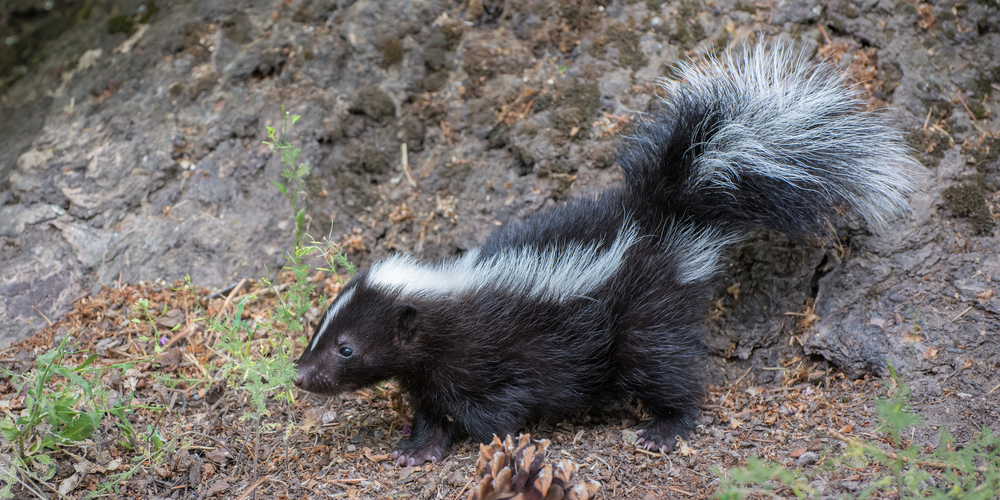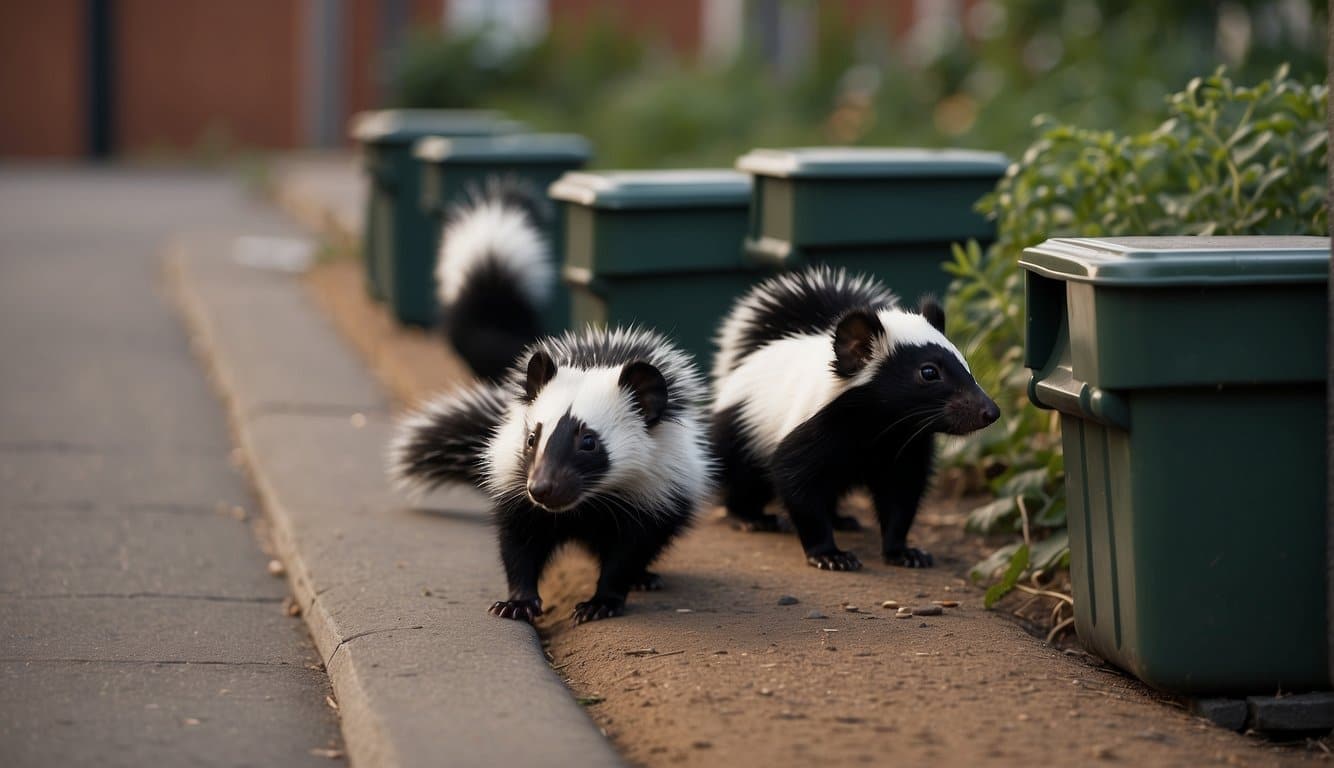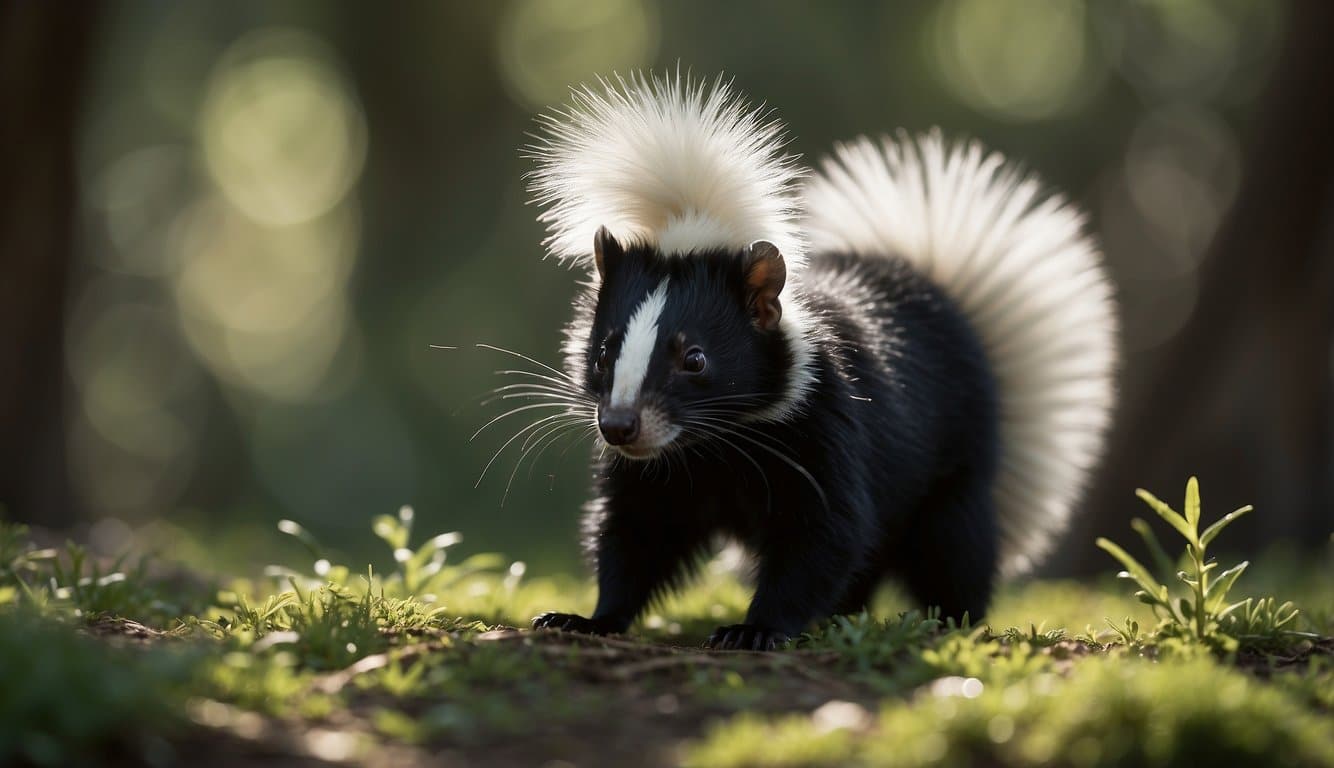Getting Rid of Skunks Using Our Step By Step Plan

Step 1: Identify Skunk Activity
- Question: Have you noticed signs of skunk activity, such as holes in your yard, skunk tracks, or a strong odor?
- Yes: Proceed to Step 2.
- No: Maintain regular yard inspections and preventive measures.
Step 2: Remove Attraction Sources
- Action: Eliminate food and shelter that attract skunks.
- Food Sources: Secure garbage cans with locking lids, remove pet food from outdoors, and cover compost bins.
- Shelter: Seal off crawl spaces, decks, and sheds to prevent skunks from nesting.
Step 3: Install Exclusion Barriers
- Action: Prevent skunks from entering specific areas.
- Methods:
- Fencing: Install a sturdy fence that is buried at least 1 to 2 feet underground and extends outward at a 90-degree angle.
- Gravel Borders: Place gravel around the base of the home to deter digging.
- Methods:
Step 4: Use Repellents
- Question: Would you like to use repellents?
- Yes: Apply natural or commercial repellents.
- Natural Repellents: Use ammonia-soaked rags or mothballs in areas where skunks frequent (use with caution as these can be harmful if misused).
- Commercial Repellents: Purchase repellents specifically designed for skunks; follow manufacturer’s instructions.
- No: Consider humane trapping.
- Yes: Apply natural or commercial repellents.
Step 5: Humane Trapping
- Question: Are skunks causing significant problems?
- Yes: Consider humane live trapping.
- Method: Use a live trap baited with appealing foods like canned fish or cat food.
- Note: Check local wildlife laws before trapping and relocating skunks. It’s often illegal to relocate skunks without a permit.
- No: Continue with non-trapping methods.
- Yes: Consider humane live trapping.
Step 6: Professional Help
- Action: If you’re unable to manage the skunk problem on your own, or if it’s illegal to trap and relocate skunks in your area, contact a professional wildlife control expert.
Step 7: Prevent Future Encounters
- Routine Actions:
- Regular Monitoring: Keep an eye on potential nesting sites and signs of skunk activity.
- Maintain Barriers: Ensure all exclusion measures are intact and effective.
Step 8: Community Coordination
- Action: Work with neighbors to ensure community-wide efforts are in place to prevent skunk attractions like unsecured trash and food sources.
Additional Tips
- Avoid cornering or threatening a skunk as it increases the likelihood of being sprayed.
- Regularly inspect and maintain the integrity of physical barriers to keep skunks and other wildlife out.
Skunks Be Gone: The Essentials
When you’re facing a skunk takeover in your own backyard, here’s your strategic, no-nonsense guide to reclaim your space with confidence and a pinch of outdoor savvy.
Identify and Remove Attractants:
- Secure your trash cans with tight-fitting lids.
- Pet food should never be left outside.
- Remove potential food sources like fallen fruits or accessible bird seeds.
Denying Entry:
- Block off entry points to sheds, decks, or crawl spaces with sturdy wire mesh.
- Use rocks or fencing to cover any skunk-sized holes in your yard.
Skunk Deterrents:
- Arrange motion-activated lights or sprinklers around your yard.
- Create a homemade mix like a DIY citrus peel spray, which can be a natural repellent.
Trapping Skunks: (Note: Check local regulations first!)
- A spray-proof skunk trap may be your ticket to a skunk-free zone.
- Once trapped, cover the trap with a tarp for safe transport and release.
Using Repellents:
- Consider natural repellents such as peppermint oil or a commercial animal deterrent.
- Capsaicin-based products, found in hot peppers, can be an effective, non-toxic option to keep skunks at bay.
Odor Neutralization Tactics
When a skunk surprise leaves you holding your nose, fast action with the right tactics can make a world of difference. Here’s how you can tackle that potent skunk odor with both home remedies and store-bought solutions.
Home Remedies for Skunk Smell (Proceed at Your Risk)
If you’re in a pinch, you likely have what you need for skunk smell removal right at home:
- Hydrogen Peroxide Mixture: Combine:
- 1 quart of 3% hydrogen peroxide
- ¼ to ½ cup of baking soda
- 1 teaspoon of dishwashing liquid
Apply this homemade mixture to the affected area, but be mindful it may bleach fabrics.
- Vinegar Solution: White vinegar can help neutralize odors.
- Soak washable items in a mixture of equal parts water and vinegar.
- Boil vinegar in a pot to help remove airborne odors.
Store-Bought Skunk Odor Eliminators
Your local store shelves are stocked with products designed specifically for skunk odor elimination:
- Skunk-specific Shampoos and Soaps: These are formulated to neutralize skunk odor on pets thoroughly.
- Commercial Odor Neutralizers: Look for products with enzymes that break down the skunk oil, rendering the smell inert.
- Activated Charcoal: Effective for absorbing odors from large areas like a room or a car interior.
Preventative Measures
Taking steps to deter skunks can be just as crucial as dealing with an infestation after it happens. Secure your home’s perimeter and employ natural repellents to keep these striped intruders at bay.
Securing the Perimeter
- Seal Off Entry Points: Walk around your home and close off any potential skunk hideouts. Use sturdy materials like hardware cloth to cover openings under decks, porches, and sheds.
- Inspect Foundation: Check for cracks in your foundation where skunks could enter. Seal these areas with concrete or metal flashing.
- Trash Management: Skunks love easy meals. Make sure your trash cans have tight-fitting lids and, if possible, store them in a closed area until collection day.
- Pet Food Practices: Don’t leave pet food outside overnight. If you feed your pets outdoors, remove any leftover food promptly to avoid attracting skunks.
Natural Skunk Repellents
- Citrus Peels: Scatter orange or lemon peels around your garden; skunks dislike the smell.
- Predator Urine: Find predator urine, like that of foxes or dogs, at your local garden store. Sprinkling some around the edges of your property creates a scent barrier that skunks tend to avoid.
- DIY Mixes: Create a mixture of jalapeno or cayenne pepper with water and a little dish soap to spray in problem areas. These spicy scents discourage skunk visits.
- Light It Up: Make your yard less appealing with bright lights. Skunks are nocturnal and shy away from well-lit areas.
Skunk Encounter: What To Do
If you find yourself facing a skunk in your yard, it’s critical to know the immediate steps to take and when to call in professional removal services.
Immediate Actions Post-Skunk Visit
- Stay Calm and Slowly Back Away: Sudden movements can startle the skunk, potentially leading to that notorious spray.
- Do Not Attempt to Remove the Skunk Yourself: Skunks can carry rabies, and it is best to avoid close interaction.
- Should you or your pets be sprayed:
- For Humans: Mix a solution of 1 quart of 3% hydrogen peroxide, ¼ cup of baking soda, and 1-2 teaspoons of liquid soap. Wash the affected area well, being careful not to get the mixture in your eyes.
- For Pets: Use the same mixture as above but be cautious around their face. You may need to apply the mixture multiple times for full deodorization.
Professional Skunk Removal Services
- Seek Local Experts: Contacting a professional skunk removal service ensures safe and humane handling of the animal.
- Skunk-Proofing Advice: Additionally, these pros can offer guidance on how to secure your property to prevent future visits.
- When choosing a service, consider:
- Credentials and Experience: Look for providers with a proven track record.
- Safe Removal Techniques: Ensure they use humane methods to remove and relocate skunks.
Landscaping Tips To Deter Skunks
Your garden might be a haven for skunks, but with a few clever landscaping tricks, you can transform it into a no-skunk zone!
- Light Up Your Yard: Skunks are nocturnal and shy away from bright lights. Installing motion-activated lights can startle these nighttime visitors and encourage them to scurry away.
- Create a Barrier: Skunks aren’t great climbers. Use this to your advantage by building a fence that’s at least 1.5 feet high and digs down into the ground about a foot to prevent digging.
Material Height Above Ground Depth Below Ground Chicken Wire 1.5 feet 1 foot Solid Wood 1.5 feet 1 foot Hardware Cloth 1.5 feet 1 foot - Remove Food Sources: Skunks love your trash and leftovers. Secure your garbage lids, and keep pet food inside to avoid an unexpected skunk feast.
- Select Skunk-repellent Plants: Some plants like citrus and peppermint offend skunks’ sensitive noses. Planting a perimeter of these can act as a natural deterrent.
Frequently Asked Questions
When it comes to getting rid of skunks, you might have some questions, and we’ve got the answers.
Let’s dive into the common queries about keeping these striped visitors at bay, using practical and effective solutions.
What are the most effective natural methods to deter skunks?
If you’re seeking natural deterrents for skunks, your go-to options should include citrus peels, which skunks find unpalatable, and installing motion-activated lights that startle them away from your property.
Can mothballs be used to repel skunks, and how should they be applied?
Yes, mothballs can repel skunks, and they should be placed in breathable bags near skunk-prone areas.
However, use them with caution, as mothballs contain toxic substances that are harmful to children and pets.
What strategies can prevent skunks from taking residence under the house?
To prevent skunks from taking up residence under your house, ensure all entry points are blocked with sturdy materials like hardware cloth.
It’s also wise to remove food sources that might attract them, such as pet food or garbage.
How can you keep your yard skunk-free during the nighttime?
Keeping your yard skunk-free at night involves reducing attractants like accessible garbage or compost and setting up barriers such as fences to prevent skunks from entering.
Additionally, use bright motion-activated outdoor lighting as a deterrent.
What scents or substances are known to repel skunks?
Skunks have a strong dislike for certain scents and substances.
Peppermint oil and ammonia-soaked rags can act as powerful repellents.
Just be sure to regularly replace the rags to maintain their effectiveness.
What home remedies can neutralize skunk odor effectively?
When it comes to neutralizing skunk odor, a dependable home remedy involves a mixture of hydrogen peroxide, baking soda, and dish soap.
Apply this solution to the affected area, but first test for colorfastness on fabrics to avoid damage.
Last update on 2025-04-15 / Affiliate links / Images from Amazon Product Advertising API





